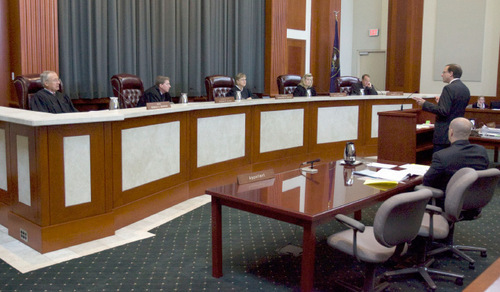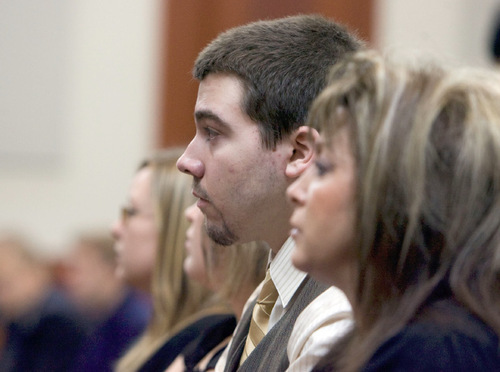This is an archived article that was published on sltrib.com in 2011, and information in the article may be outdated. It is provided only for personal research purposes and may not be reprinted.
The Utah Supreme Court on Tuesday rejected a Virginia father's appeal to overturn the adoption of his daughter, a child known as "Baby Emma," finding he did not meet required deadlines for asserting his parental rights.
The justices also ruled John M. Wyatt was barred from arguing that the federal Parental Kidnapping Prevention Act required Utah to follow a Virginia judge's order giving him custody of his daughter because he did not raise that argument in a lower court.
Attorney Larry Jenkins, who represents adoptive parents Thomas and Chandra Zarembinski and their adoption agency, said his clients were declining interviews and had asked him not to speak about the decision because of a federal lawsuit still pending in Virginia in which Wyatt alleges he was fraudulently deprived of his parental rights.
"I can say they are very gratified with the ruling," Jenkins said. "They think the court did the right thing."
In Virginia, Wyatt said he was not surprised by the decision.
"This is what Utah does," he said. "They steal people's babies. It is like a big game to these people."
But it's not over, Wyatt said. "I am going to keep fighting for my daughter," he said, adding a U.S. Supreme Court challenge is likely. "Whether I have to wait until she is of age, I want to be a part of her life. There is nothing anyone or those people can do to stop me from being part of her life."
Jeri Wyatt, John's mother, said she was "just heartbroken. We're not stopping, and we're going to fight like hell to get that baby back. They are not going to steal this baby because that's all it is — a kidnapping. Shame on Utah for crafting biased, unconstitutional laws against unmarried biological fathers. The state of Utah has been doing this for years and they'll continue doing it, and somebody has to stop it."
Wyatt has said he opposed the adoption of his daughter, born Feb. 10, 2009 in Virginia and placed with a Utah couple days later through A Act of Love adoption agency, from the start. He had hoped to raise the child, either alone or with his then-girlfriend, Emily Colleen Fahland, who is the birth mother. Fahland relinquished her parental rights to her daughter on Feb. 12, 2009.
Joshua Peterman, Wyatt's attorney, argued a time-stamped receipt shows Wyatt filed visitation and custody petitions on Feb. 18 — five days before the Zarembinskis initiated an adoption proceeding in Utah. Wyatt also never received proper notice of Fahland's intention to proceed with an adoption, Peterman said.
But Jenkins claimed Wyatt didn't comply with other legal requirements in either state. The high court sided with Jenkins and noted Wyatt did not file anything with Utah until April 28.
"The district court correctly concluded that Mr. Wyatt failed to assert his parental rights in time in either Utah or Virginia prior to the birth mother's relinquishment of her parental rights in [Baby Emma] and thus waived all rights to contest the adoption," wrote Justice Jill Parrish for the court.
Utah's statute requires unmarried biological fathers to follow a strict time frame, regardless of where they reside or where a child is born, to preserve any right to object to an adoption. The biological father must show he did not and could not have known an adoption was being considered; begin court proceedings to establish his paternity before a birth mother gives consent for an adoption to proceed; and demonstrate he is fully committed to assuming his parental responsibilities, such as paying for pregnancy-related expenses.
At least half a dozen unmarried biological fathers have waged unsuccessful efforts to stop adoptions in Utah. In one case, the court found a father was on notice when his pregnant girlfriend told him she was in Utah; in another, the court said a father failed to adequately show how he would provide for a child.
In the Baby Emma case, the court for the first time reviewed whether a federal kidnapping law applied to an adoption proceeding.
The kidnapping act's primary intent is to prevent parents from state shopping in pursuit of more favorable child custody determinations. It includes rules designed to help govern which state has jurisdiction in a custody dispute — which Wyatt argued applied in the Baby Emma case and required a Utah judge to defer to a Virginia order granting him custody. A majority of justices agreed that since the federal act refers to "any proceeding for a custody or visitation determination," it applies to adoptions; but it found Wyatt failed to make that argument in a lower court and thus couldn't raise it in his appeal.
In separate opinions, justices Ronald Nehring and Thomas Lee concluded that Congress did not intend the kidnapping act to apply to adoption proceedings. Lee said the federal law governs only custody and visitation rights in divorce cases, rights that can be modified over time. Adoptions, however, are final, Lee wrote.
Peterman said since the ruling didn't get to the merits of Wyatt's appeal, it leaves unresolved how the federal kidnapping act applies in adoption cases. Peterman said he currently is representing three other biological fathers who are contesting adoptions.
"This isn't an isolated case, this is a pattern of cases coming through Utah," Peterman said.
Twitter: @Brooke4Trib —
Online
O Read the UtahSupreme Court opinion. › tinyurl.com/3znm28d —
More about the Baby Emma case
Court hears arguments in 'Baby Emma' case • tinyurl.com/3f2yhd6
Virginia father asks federal court to decide adoption case • tinyurl.com/3z598c2
John Wyatt's website • babyemmawyatt.com





